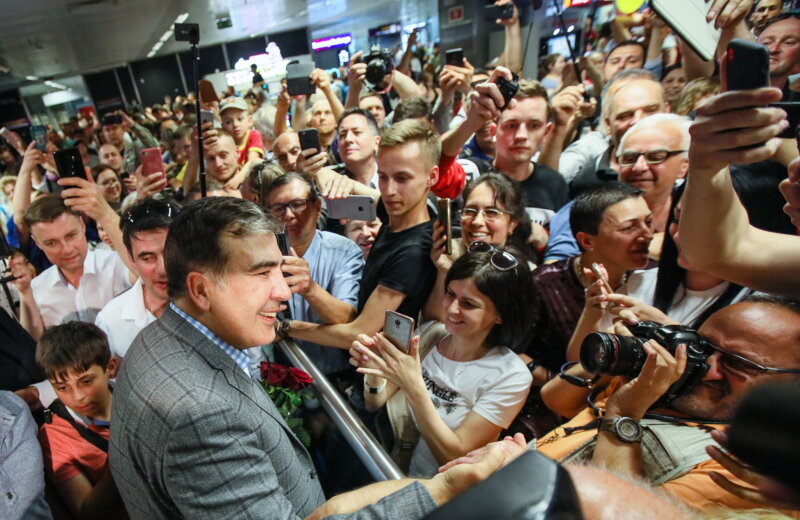Former Georgian President Mikheil Saakashvili said on April 22 that Ukrainian President Volodymyr Zelensky had offered him the job of deputy prime minister for reforms.
The offer comes as Zelensky’s administration is under pressure to push through reforms as it desperately needs foreign loans amid the global economic crisis and the COVID-19 pandemic. The administration has also recently faced its first corruption scandal, and gave a weak response to accusations.
Saakashvili served as the governor of Odesa Oblast under Zelensky’s predecessor Petro Poroshenko. However, he fell out with Poroshenko and was stripped of his Ukrainian citizenship, prosecuted and deported.
The ex-Georgian president returned to Ukraine in 2019, when Zelensky restored his Ukrainian citizenship. Many expected him to get an appointment, but instead he kept a low profile — until now.
“It’s a great honor for me to get an offer from President Zelensky to become deputy prime minister for reforms,” Saakashvili wrote on Facebook. “I supported Zelensky during the election and I’ve had big hopes for Ukraine and for Zelensky’s team during the whole time when he’s been president.”
Saakashvili also said he had discussed the job offer with Prime Minister Denys Shmygal. He added that he would present his reform proposals to the Verkhovna Rada.
“Zelensky has met with ex-Georgian President Mikheil Saakashvili and spoken to him about his vision about possibly helping Ukraine’s development,” Zelensky’s press office told the Kyiv Post. “Mikheil Saakashvili is known internationally and has demonstrated successful implementation of reforms. President Zelensky believes that Mr. Saakashvili has potential for supporting Ukraine’s Cabinet and proposed that he share his vision and plans with the Cabinet and parliament of Ukraine.”
Oleksandr Kachura, a lawmaker from Zelensky’s Servant of the People party, confirmed that Saakashvili’s candidacy is being considered for the job of deputy prime minister for reforms.
Kachura and Yevhenia Kravchuk, a deputy head of the Servant of the People faction, said that the faction will meet with Saakashvili before the Rada’s next session, which is scheduled for April 24.
Kravchuk told the Novoye Vremya magazine that Saakashvili’s candidacy had been proposed by Zelensky.
Work under Poroshenko
Saakashvili was the president of Georgia in 2004 to 2013 and implemented major free-market and law enforcement reforms in the country. He left Georgia in 2013, and the new government opened criminal cases against him in what he sees as a political reprisal.
Later Poroshenko invited Saakashvili to Ukraine and appointed him as governor of Odesa Oblast in 2015.
However, Saakashvili resigned as governor in 2016, accusing Poroshenko allies of corruption and blocking reforms. In 2017 Poroshenko stripped Saakashvili of his citizenship amid a major political confrontation with him – a measure that the ex-Georgian president believes it to be an unlawful political vendetta.
Poroshenko Bloc lawmaker Volodymyr Aryev said in 2017 that Saakashvili had been stripped of citizenship because he had allegedly concealed information that he was under investigation in Georgia when he applied for citizenship in 2015.
Saakashvili and his lawyers argued that the cancellation of his citizenship contradicted Ukrainian and international law, the Constitution and due process, which is denied by Ukrainian authorities.
Return to Ukraine and deportation
Saakashvili returned to Ukraine by breaking through the Polish border in September 2017. Saakashvili’s lawyers said that crossing of the border “in cases of extreme necessity” was not illegal under Ukrainian law, while a Ukrainian court had found him guilty of an administrative infraction.
In December 2017 the Prosecutor General’s Office arrested and charged Saakashvili with complicity in tycoon Serhiy Kurchenko’s criminal group for allegedly receiving money from Kurchenko to finance protests against Poroshenko. Saakashvili believes the case to be part of Poroshenko’s political vendetta against him.
He was released from custody by Pechersk Court Judge Larysa Tsokol, who ruled that Saakashvili’s arrest without a court warrant was unlawful.
Ukrainian authorities then deported Saakashvili without a court order in February 2018. They said he had been expelled for illegally entering Ukraine in September – an accusation that he denies.
However, Ukrainian law explicitly bans deportation without a court order.
In February 2020, the State Investigation Bureau charged former border guards with Saakashvili’s unlawful deportation.



